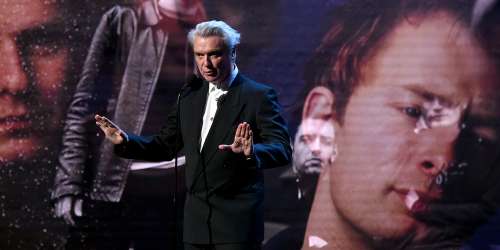David Byrne Inducts Radiohead Into the Rock and Roll Hall of Fame

CREDIT: Jamie McCarthy/Getty Images For The Rock and Roll Hall of Fame
By Rob Arcand
David Byrne gave a speech inducting Radiohead into the Rock and Roll Hall of Fame. Though the band weren’t fully present at the ceremony, with only Ed O’Brien and Phil Selway present after Thom Yorke announced earlier this year that he’d be skipping out on the ceremony, Byrne still spoke to the band’s impact on rock and roll, discussing everything from the way that they market their music to the fact that their name is based on a Talking Heads song.
“I was surprised and very flattered when Radiohead stated that they’d named themselves after a song that I had written,” Byrne said during his speech. “I did ask myself, ‘Why that song?’ I still haven’t been able to figure it out, and in a certain way I don’t want to know. This was kind of a goofy Tex-Mex song that I’d written. Maybe we’ll find out, who knows.”
Byrne also said that the “quality and constant innovation” of their music had cemented their place in the history of rock music. “They’re creative and smart in both areas [as artists and music marketers], which is a rare combination for artists—not just then or now but any time.”
Read Byrne’s full speech below.
Thank you. I was surprised and very flattered when Radiohead stated they named themselves after a song that I had written. I did ask myself, “Why that song?” I still haven’t been able to figure it out, and in a certain way I don’t want to know. This was kind of a goofy Tex-Mex song that I’d written. Maybe we’ll find out, who knows.
Thankfully, I’m a huge fan of the group. They richly deserve this honor for two reasons: the music, the quality and constant innovation in the music, but equally for the innovations in how they release their work and how they market it and get it to the public—things that have changed the entire music business, and there’s quite a few people in the music business in this room tonight. They’re creative and smart in both areas, which is a rare combination for artists—not just then or now but any time.
OK here’s a tidbit: Radio 1, that’s in the UK, refused to play their song “Creep” because they found it too depressing. Then it started getting played in lots of other places all around the world and the rest is, well, you know.
Here’s another tidbit—sorry if there’s anyone here directly affected by this one—Capitol Records felt that what many consider to be their masterpiece, OK Computer, was career suicide and adjusted their release and marketing plan accordingly. It eventually went to No. 1 in the UK. “Paranoid Android” from that album was considered the new “Bohemian Rhapsody,” whatever that means. I’m looking forward to seeing the movie, and seeing who will play Thom.
For me, their record after that, Kid A, was my conversion moment. The record joined together electronics with song forms blew me away. I’d never heard anything like it. There are elements and influences of Can and Miles Davis’s electric period, but this was very different.
What was really weird and very encouraging was that it was popular. It was a hit! It proved to me that the artistic risk paid off and music fans sometimes are not stupid. Some of that will be attested to by those in the music industry in the room tonight. As experimental as it was, it went to No. 1 in the U.S. Business-wise, they were already innovating. This was in the year 2000, with an app that you could stream music on and access things.
Now a few records later, with In Rainbows, the music that at one point sounded radical and on the edge now felt completely natural. And at that point they took the radical leap of selling the record for the price of “pay what you wish.” You could pay zero or one cent. You could pay the price that records were going for that year. It turned out most people did pay the going rate, and some people actually paid more. Which was, I thought, an incredible thing. They showed trust in the audience, trust in the public. They trusted them to place value in the music and say: You tell us what you think it’s worth. And the audience responded and said: We think it’s worth something. This was a wonderful social experiment, not just an experiment in the music business.
Further release innovations: They released the rejected Bond theme “Spectre,” which was never used, on SoundCloud. And musically, they keep changing. Their last record, A Moon Shaped Pool, sounded very cinematic, sounded like a movie in your head. They’ve both changed our idea of what popular music can be and how it can be released and marketed to us. For those things, I am honored to induct Radiohead into the Rock & Roll Hall of Fame.